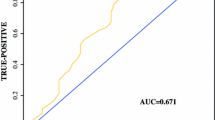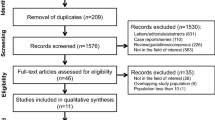Abstract
Purpose
The MUNICON trial confirmed prospectively the usefulness of early response evaluation by 2-deoxy-2-[F-18]fluoro-D-glucose-positron emission tomography (FDG-PET) . Metabolic responders (R) showed initially a higher FDG uptake compared with nonresponders (p = 0.018). An association of the vascular endothelial growth factor (VEGF) 936C>T polymorphism and FDG uptake was reported for breast cancer. Therefore, we investigated the VEGF 936C>T polymorphism for an association with response and survival.
Procedures
The study was based on 110 patients included in the MUNCON trial (103 male, seven female; 75 AEG I, 35 AEG II, event-free survival (EFS) median 21.1 ± 4.6 months). Response was significantly associated with EFS. The VEGF 936C>T polymorphism was determined by PCR and restriction fragment length polymorphism analysis. For analysis, the T-variants were combined.
Results
One hundred two patients were evaluable. Seventy-two patients showed the CC, 24 the CT, and six the TT genotype. Median EFS was 29.3 months for CC and 11.7 months for CT/TT (p = 0.04). No association of the genotypes (CC or CT/TT) with the SUV or response was found. Multivariate analysis revealed histopathological regression (p = 0.003) and genotype (p = 0.04) as independent prognostic factors. A combination of genotype and PET response (Gen-PET) defines three prognostic groups early in the course of treatment (p = 0.002). Cox regression analysis including clinical and histopathological response and Gen-PET reveals Gen-PET as independent prognostic factor (p = 0.003).
Conclusion
The VEGF 936C>T polymorphism is a prognostic factor in patients undergoing neoadjuvant chemotherapy, although it is not associated with FDG uptake and response. The combination of metabolic response and VEGF 936C>T polymorphism defines three different prognostic groups. These findings need to be confirmed prospectively.
This study has been registered in the European Clinical Trials Database as trial 2007-003356-11.



Similar content being viewed by others
References
Ott K, Weber WA, Lordick F et al (2006) Metabolic imaging predicts response, survival, and recurrence in adenocarcinomas of the esophagogastric junction. J Clin Oncol 24:4692–4698
Weber WA, Ott K, Becker K et al (2001) Prediction of response to preoperative chemotherapy in adenocarcinomas of the esophagogastric junction by metabolic imaging. J Clin Oncol 19:3058–3065
Lordick F, Ott K, Krause BJ et al (2007) PET to assess early metabolic response and to guide treatment of adenocarcinoma of the oesophagogastric junction: the MUNICON phase II trial. Lancet Oncol 8:797–805
Siewert J.R.; Lordick F.; Ott K., et al. (2007) Induction chemotherapy in Barrett cancer: influence on surgical risk and outcome. Ann Surg 246:624–628; discussion 628–631
Westerterp M, van Westreenen HL, Reitsma JB et al (2005) Esophageal cancer: CT, endoscopic US, and FDG PET for assessment of response to neoadjuvant therapy–systematic review. Radiology 236:841–851
Wieder HA, Beer AJ, Lordick F et al (2005) Comparison of changes in tumor metabolic activity and tumor size during chemotherapy of adenocarcinomas of the esophagogastric junction. J Nucl Med 46:2029–2034
Jin Q, Hemminki K, Enquist K et al (2005) Vascular endothelial growth factor polymorphisms in relation to breast cancer development and prognosis. Clin Cancer Res 11:3647–3653
Chung YS, Maeda K, Sowa M (1996) Prognostic value of angiogenesis in gastro-intestinal tumours. Eur J Cancer 32A:2501–2505
Maeda K, Chung YS, Ogawa Y et al (1996) Prognostic value of vascular endothelial growth factor expression in gastric carcinoma. Cancer 77:858–863
Yamamori M, Sakaeda T, Nakamura T et al (2004) Association of VEGF genotype with mRNA level in colorectal adenocarcinomas. Biochem Biophys Res Commun 325:144–150
Mor G, Visintin I, Lai Y et al (2005) Serum protein markers for early detection of ovarian cancer. Proc Natl Acad Sci USA 102:7677–7682
Hicklin DJ, Ellis LM (2005) Role of the vascular endothelial growth factor pathway in tumor growth and angiogenesis. J Clin Oncol 23:1011–1027
Wong C, Wellman TL, Lounsbury KM (2003) VEGF and HIF-1alpha expression are increased in advanced stages of epithelial ovarian cancer. Gynecol Oncol 91:513–517
Poon RT, Fan ST, Wong J (2001) Clinical implications of circulating angiogenic factors in cancer patients. J Clin Oncol 19:1207–1225
Karayiannakis AJ, Syrigos KN, Polychronidis A et al (2002) Circulating VEGF levels in the serum of gastric cancer patients: correlation with pathological variables, patient survival, and tumor surgery. Ann Surg 236:37–42
Shah MA, Ramanathan RK, Ilson DH et al (2006) Multicenter phase II study of irinotecan, cisplatin, and bevacizumab in patients with metastatic gastric or gastroesophageal junction adenocarcinoma. J Clin Oncol 24:5201–5206
Balasubramanian SP, Brown NJ, Reed MW (2002) Role of genetic polymorphisms in tumour angiogenesis. Br J Cancer 87:1057–1065
Bae SJ, Kim JW, Kang H et al (2008) Gender-specific association between polymorphism of vascular endothelial growth factor (VEGF 936 C>T) gene and colon cancer in Korea. Anticancer Res 28:1271–1276
Yapijakis C, Vairaktaris E, Vassiliou S et al (2007) The low VEGF production allele of the +936C/T polymorphism is strongly associated with increased risk for oral cancer. J Cancer Res Clin Oncol 133:787–791
Ruzzo A, Graziano F, Kawakami K et al (2006) Pharmacogenetic profiling and clinical outcome of patients with advanced gastric cancer treated with palliative chemotherapy. J Clin Oncol 24:1883–1891
Kim JG, Sohn SK, Chae YS et al (2007) Vascular endothelial growth factor gene polymorphisms associated with prognosis for patients with gastric cancer. Ann Oncol 18:1030–1036
Tzanakis N, Gazouli M, Rallis G et al (2006) Vascular endothelial growth factor polymorphisms in gastric cancer development, prognosis, and survival. J Surg Oncol 94:624–630
Lu H, Shu XO, Cui Y et al (2005) Association of genetic polymorphisms in the VEGF gene with breast cancer survival. Cancer Res 65:5015–5019
Hefler LA, Mustea A, Konsgen D et al (2007) Vascular endothelial growth factor gene polymorphisms are associated with prognosis in ovarian cancer. Clin Cancer Res 13:898–901
Li D, Frazier M, Evans DB et al (2006) Single nucleotide polymorphisms of RecQ1, RAD54L, and ATM genes are associated with reduced survival of pancreatic cancer. J Clin Oncol 24:1720–1728
Schultheis AM, Lurje G, Rhodes KE et al (2008) Polymorphisms and clinical outcome in recurrent ovarian cancer treated with cyclophosphamide and bevacizumab. Clin Cancer Res 14:7554–7563
Krippl P, Langsenlehner U, Renner W et al (2003) A common 936 C/T gene polymorphism of vascular endothelial growth factor is associated with decreased breast cancer risk. Int J Cancer 106:468–471
Renner W, Kotschan S, Hoffmann C et al (2000) A common 936 C/T mutation in the gene for vascular endothelial growth factor is associated with vascular endothelial growth factor plasma levels. J Vasc Res 37:443–448
Bradbury PA, Zhai R, Ma C et al (2009) Vascular endothelial growth factor polymorphisms and esophageal cancer prognosis. Clin Cancer Res 15:4680–4685
Wolf G, Aigner RM, Schaffler G et al (2004) The 936C>T polymorphism of the gene for vascular endothelial growth factor is associated with 18F-fluorodeoxyglucose uptake. Breast Cancer Res Treat 88:205–208
Bader FG, Lordick F, Fink U et al (2008) Paclitaxel in the neoadjuvant treatment for adenocarcinoma of the distal esophagus (AEG I). A comparison of two phase II trials with long-term follow-up. Onkologie 31:366–372
Ott K, Bader FG, Lordick F et al (2009) Surgical factors influence the outcome after Ivor-Lewis esophagectomy with intrathoracic anastomosis for adenocarcinoma of the esophagogastric junction: a consecutive series of 240 patients at an experienced center. Ann Surg Oncol 16:1017–1025
Ott K, Sendler A, Becker K et al (2003) Neoadjuvant chemotherapy with cisplatin, 5-FU, and leucovorin (PLF) in locally advanced gastric cancer: a prospective phase II study. Gastric Cancer 6:159–167
Chak A, Canto MI, Cooper GS et al (2000) Endosonographic assessment of multimodality therapy predicts survival of esophageal carcinoma patients. Cancer 88:1788–1795
Lowy AM, Mansfield PF, Leach SD et al (1999) Response to neoadjuvant chemotherapy best predicts survival after curative resection of gastric cancer. Ann Surg 229:303–308
Becker K, Mueller JD, Schulmacher C et al (2003) Histomorphology and grading of regression in gastric carcinoma treated with neoadjuvant chemotherapy. Cancer 98:1521–1530
Bos R, van Der Hoeven JJ, van Der Wall E et al (2002) Biologic correlates of (18)fluorodeoxyglucose uptake in human breast cancer measured by positron emission tomography. J Clin Oncol 20:379–387
Avril N, Rose CA, Schelling M et al (2000) Breast imaging with positron emission tomography and fluorine-18 fluorodeoxyglucose: use and limitations. J Clin Oncol 18:3495–3502
Lurje G, Zhang W, Schultheis AM et al (2008) Polymorphisms in VEGF and IL-8 predict tumor recurrence in stage III colon cancer. Ann Oncol 19:1734–1741
Heist RS, Zhai R, Liu G et al (2008) VEGF polymorphisms and survival in early-stage non-small-cell lung cancer. J Clin Oncol 26:856–862
Kim JG, Chae YS, Sohn SK et al (2008) Vascular endothelial growth factor gene polymorphisms associated with prognosis for patients with colorectal cancer. Clin Cancer Res 14:62–66
Wieder HA, Geinitz H, Rosenberg R et al (2007) PET imaging with [18F]3'-deoxy-3'-fluorothymidine for prediction of response to neoadjuvant treatment in patients with rectal cancer. Eur J Nucl Med Mol Imaging 34:878–883
Ott K, Vogelsang H, Marton N et al (2006) The thymidylate synthase tandem repeat promoter polymorphism: a predictor for tumor-related survival in neoadjuvant treated locally advanced gastric cancer. Int J Cancer 119:2885–2894
Author information
Authors and Affiliations
Corresponding author
Additional information
Sylvie Lorenzen and Ben Panzram contributed equally in this manuscript.
Rights and permissions
About this article
Cite this article
Lorenzen, S., Panzram, B., Keller, G. et al. Association of the VEGF 936C>T Polymorphism with FDG Uptake, Clinical, Histopathological, and Metabolic Response in Patients with Adenocarcinomas of the Esophagogastric Junction. Mol Imaging Biol 13, 178–186 (2011). https://doi.org/10.1007/s11307-010-0330-0
Published:
Issue Date:
DOI: https://doi.org/10.1007/s11307-010-0330-0




